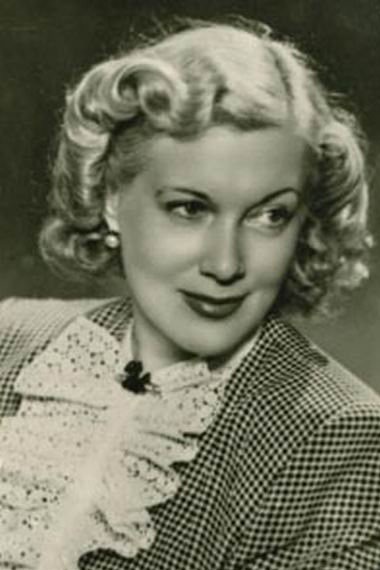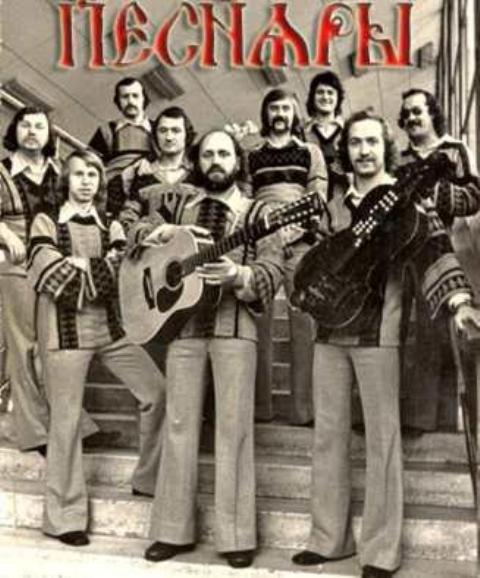Variety and Pop Music
The variety and pop music in the Soviet Union was characterized by individual entertainers and musical ensembles performing songs which were written by professional composers and poets. The emphasis was on the vocal qualities of the performers and on clear, catchy melodies.
Lyubov Orlova
During the Stalin period, Lyubov Petrovna Orlova (1902-1975) was one of the first stars. She was the wife of film director Grigory Aleksandrov (1903-1983) and acted and sang in musicals like Цирк [Tsirk] or The Circus. In general, there was much interaction between film and light music. The songs of the famous vaudeville artists were regularly performed in movies, and artist often included songs from movies in their repertoires.

Lyubov Petrovna Orlova
Other renowned entertainers of that era were Leonid Osipovich Utyosov (1895-1982), Klavdiya Ivanovna Shulzhenko (1906-1984) and Rashid Behbudov (1915-1989).
The era of stagnation
In the period from 1973 to 1986, often referred to as the эпоха застоя [epokha zastoya] or the era of stagnation, which roughly corresponds to the period in which Leonid Ilyich Brezhnev (1906-1982), Yuri Vladimirovich Andropov (1914-1984) and Konstantin Ustinovich Chernenko (1911-1985) were into power, the variety shows and pop music were completely dominated by the state. The music was made by members of the Union of Soviet Composers and the lyrics were written by professional and «reliable» poets. Especially in terms of lyrics, the creativeness was strictly encapsulated, and the subjects were limited to patriotism and love.
Edward Khil
A stereotype of the singers in that period was Edward Anatolyevich Khil (°1934). With his indelible smile, carefully measured dance steps and lyrical baritone, he was presented as a charming eternal optimist. In 2009 he became known worldwide as the Trololo Man. In 1976, he had recorded a song without lyrics, with the title I'm happy because I can finally return home. The music was written by Arkady Ilyich Ostrovsky (1914-1967). According to Khil, the song had been recorded without lyrics because the original text of Lev Ivanovich Osyanin (1912-1996) would have been about an American cowboy, and therefore forbidden by the authorities. But according to Mikhail Arkadyevich Ostrovsky, the son of the composer, it was only due to a conflict between Ostrovsky and Osyanin. The latter would have said that a composer meant nothing without a copywriter, and Ostrovsky wanted to prove the opposite by composing a song with a plain meaning.

Edward Khil
On the next page, you can watch the Trololo Man
VIA's
In the 60s, the Soviet authorities increased their efforts get the emerging pop and rock music under State control. Along with the existing Union of Soviet Composers and the record company Melodiya, a new monitoring mechanism was established by the creation of the so-called VIA's.
ВИА (VIA) is the Russian acronym for the Вокально-Инструментальные Ансамбли [Vokalno-instrumentalnye Ansambli] or Vocal-instrumental ensembles. A VIA was a State-approved band of professional musicians, for which the tracks were mostly written by professional composers who were members of the Union of Soviet Composers.
If a band wanted its music to be played in the State-controlled media, it needed the status of an officially approved VIA. Each VIA needed to have a художественный руководитель [khudezhestvinny rukovoditel] or artistic director who acted as a manager, producer and controller of the State. Sometimes, the artistic director was also the principal member and songwriter of the band.
The VIA's developed their own style of pop music. They made officially approved and radio-friendly music that focused on a teenage public and in which traditional music was combined with elements of rock, disco and new wave. The VIA's performed songs about universal themes as love, joy and sorrow, but they also frequently served propaganda purposes by glorifying national culture and patriotism.
The records of the VIA's could only be produced and distributed by the State-owned Company for the production, storage and distribution of sound recordings Мелодия (Melodiya), which was established in 1964.
Pesnyary, a folk-rock band from Belarus, was one of the most famous VIA's and was also the first band that ever toured in America. Other well-known groups were Zemlyane, one of the first bands which was officially allowed to use elements of rock music in his music, and Poyushchiye gitary,a band which created such hype that it got the nickname of Soviet Beatles.

Pesnyary





